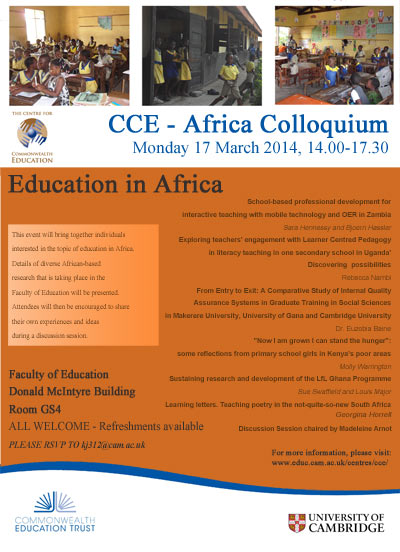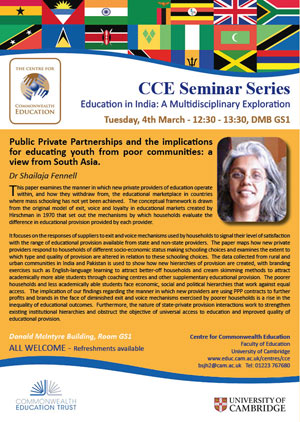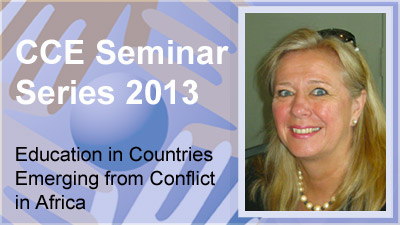ARCHIVE: This material is no longer maintained and should be viewed for reference only
CCE Seminars and Workshops
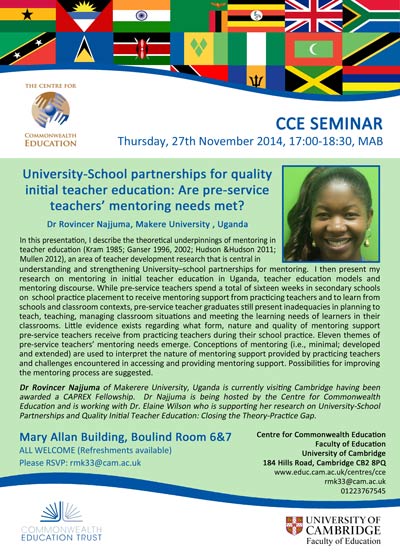 University-School partnerships for quality initial teacher education: Are pre-service teachers’ mentoring needs met?
University-School partnerships for quality initial teacher education: Are pre-service teachers’ mentoring needs met?
Dr Rovincer Najjuma, CAPREX fellow from Makere University, Uganda
Thursday 27th November 2014, Homerton College
Abstract: In this presentation, I describe the theoretical underpinnings of mentoring in teacher education (Kram 1985; Ganser 1996, 2002; Hudson &Hudson 2011; Mullen 2012), an area of teacher development research that is central in understanding and strengthening University–school partnerships for mentoring. I then present my research on mentoring in initial teacher education in Uganda, teacher education models and mentoring discourse. While pre-service teachers spend a total of sixteen weeks in secondary schools on school practice placement to receive mentoring support from practicing teachers and to learn from schools and classroom contexts, pre-service teacher graduates still present inadequacies in planning to teach, teaching, managing classroom situations and meeting the learning needs of learners in their classrooms. Little evidence exists regarding what form, nature and quality of mentoring support pre-service teachers receive from practicing teachers during their school practice. Eleven themes of pre-service teachers’ mentoring needs emerge. Conceptions of mentoring (i.e., minimal; developed and extended) are used to interpret the nature of mentoring support provided by practicing teachers and challenges encountered in accessing and providing mentoring support. Possibilities for improving the mentoring process are suggested.
For further information, see http://talks.cam.ac.uk/talk/index/56368
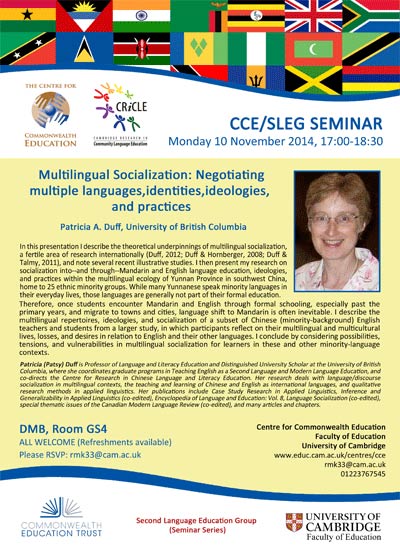 Multilingual socialization: Negotiating multiple languages, identities, ideologies, and practices
Multilingual socialization: Negotiating multiple languages, identities, ideologies, and practices
Patricia A. Duff, University of British Columbia
Monday 10th November 2014, Donald McIntyre Building
Abstract: In this presentation I describe the theoretical underpinnings of multilingual socialization, a fertile area of research internationally (Duff, 2012; Duff & Hornberger, 2008; Duff & Talmy, 2011), and note several recent illustrative studies. I then present my research on socialization into--and through--Mandarin and English language education, ideologies, and practices within the multilingual ecology of Yunnan Province in southwest China, home to 25 ethnic minority groups. While many Yunnanese speak minority languages in their everyday lives, those languages are generally not part of their formal education. Therefore, once students encounter Mandarin and English through formal schooling, especially past the primary years, and migrate to towns and cities, language shift to Mandarin is often inevitable. I describe the multilingual repertoires, ideologies, and socialization of a subset of Chinese (minority-background) English teachers and students from a larger study, in which participants reflect on their multilingual and multicultural lives, losses, and desires in relation to English and their other languages. I conclude by considering possibilities, tensions, and vulnerabilities in multilingual socialization for learners in these and other minority-language contexts.
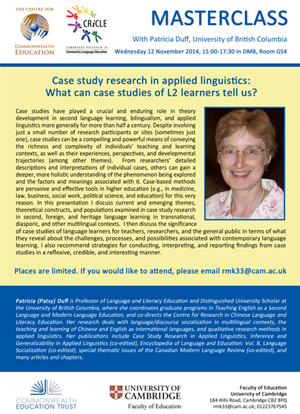 Case study research in applied linguistics: What can case studies of L2 learners tell us?
Case study research in applied linguistics: What can case studies of L2 learners tell us?
Patricia A. Duff, University of British Columbia
Wednesday 12th November 2014, Donald McIntyre Building
Abstract
Case studies have played a crucial and enduring role in theory development in second language learning, bilingualism, and applied linguistics more generally for more than half a century. Despite involving just a small number of research participants or sites (sometimes just one), case studies can be a compelling and powerful means of conveying the richness and complexity of individuals’ teaching and learning contexts, as well as their experiences, perspectives, and developmental trajectories (among other themes). From researchers’ detailed descriptions and interpretations of individual cases, others can gain a deeper, more holistic understanding of the phenomenon being explored and the factors and meanings associated with it. Case-based methods are pervasive and effective tools in higher education (e.g., in medicine, law, business, social work, political science, and education) for this very reason.
In this presentation I discuss current and emerging themes, theoretical constructs, and populations examined in case study research in second, foreign, and heritage language learning in transnational, diasporic, and other multilingual contexts. I then discuss the significance of case studies of language learners for teachers, researchers, and the general public in terms of what they reveal about the challenges, processes, and possibilities associated with contemporary language learning. I also recommend strategies for conducting, interpreting, and reporting findings from case studies in a reflexive, credible, and interesting manner.
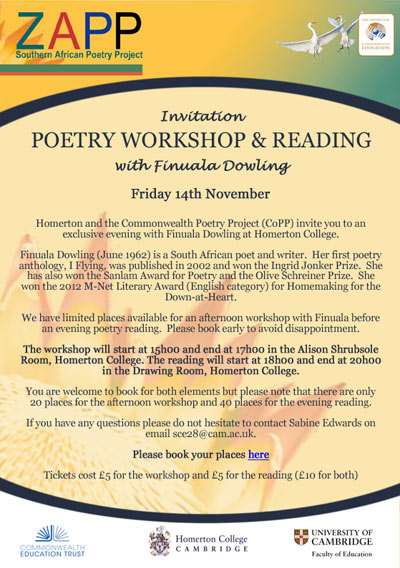 Special poetry event with Finuala Dowling, a South African poet and writer.
Special poetry event with Finuala Dowling, a South African poet and writer.
Friday 14th November 2014, Homerton College
Limited places are available for an afternoon workshop and/or an exclusive evening poetry reading.
Finuala Dowling’s first poetry collection, I Flying, won the Ingrid Jonker Prize. Her second collection, Doo-Wop Girls of the Universe, was joint winner of the Sanlam Prize for poetry, and her third, Notes from the Dementia Ward, won the Olive Schreiner Prize. She has read at the Aldeburgh Festival, at Snape Maltings, and at all major South African literary festivals.
Her first novel was What Poets Need, followed by Flyleaf. Her short stories, poems and essays have appeared in several anthologies. She has also written comic skits and plays, winning the Spier/PANSA Audience Award. [NB Publishers]
For further information see the ZAPP website: zapp.educ.cam.ac.uk
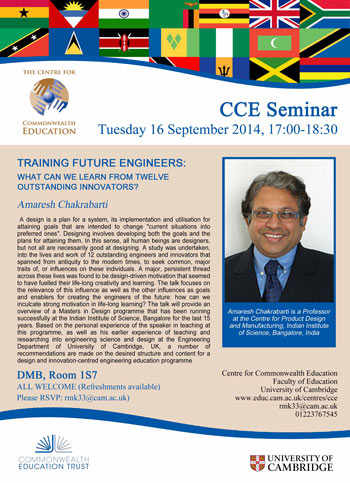 Training Future Engineers: What Can We Learn from Twelve Outstanding Innovators?
Training Future Engineers: What Can We Learn from Twelve Outstanding Innovators?
Amaresh Chakrabarti (Professor at the Centre for Product Design and Manufacturing, Indian Institute of Science)
Tuesday 16th September 2014, Donald McIntyre Building
Abstract: A design is a plan for a system, its implementation and utilisation for attaining goals that are intended to change "current situations into preferred ones". Designing involves developing both the goals and the plans for attaining them. In this sense, all human beings are designers. but not all are necessarily good at designing. A study was undertaken, into the lives and work of 12 outstanding engineers and innovators that spanned from antiquity to the modern times, to seek common, major traits of, or influences on these individuals. A major, persistent thread across these lives was found to be design-driven motivation that seemed to have fuelled their life-long creativity and learning. The talk focuses on the relevance of this influence as well as the other influences as goals and enablers for creating the engineers of the future: how can we inculcate strong motivation in life-long learning? The talk will provide an overview of a Masters in Design programme that has been running successfully at the Indian Institute of Science, Bangalore for the last 15 years. Based on the personal experience of the speaker in teaching at this programme, as well as his earlier experience of teaching and researching into engineering science and design at the Engineering Department of University of Cambridge, UK, a number of recommendations are made on the desired structure and content for a design and innovation-centred engineering education programme.
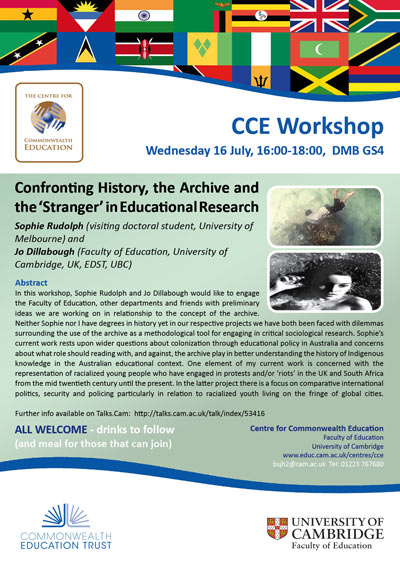 Confronting History, the Archive and the 'Stranger' in Educational Research
Confronting History, the Archive and the 'Stranger' in Educational Research
Sophie Rudolph (visiting doctoral student, University of Melbourne) and Jo Dillabough (Faculty of Eduction, University of Cambridge, UK, EDST, UBC)
Wednesday 16th July 2014, Donald McIntyre Building
Abstract: In this workshop, Sophie Rudolph and Jo Dillabough would like to engage the Faculty of Education, other departments and friends with preliminary ideas we are working on in relationship to the concept of the archive. Neither Sophie nor I have degrees in history yet in our respective projects we have both been faced with dilemmas surrounding the use of the archive as a methodological tool for engaging in critical sociological research. Sophie’s current work rests upon wider questions about colonization through educational policy in Australia and concerns about what role should reading with, and against, the archive play in better understanding the history of Indigenous knowledge in the Australian educational context. One element of my current work is concerned with the representation of racialized young people who have engaged in protests and/or ‘riots’ in the UK and South Africa from the mid twentieth century until the present. In the latter project there is a focus on comparative international politics, security and policing particularly in relation to racialized youth living on the fringe of global cities.
Further info available on Talks.Cam
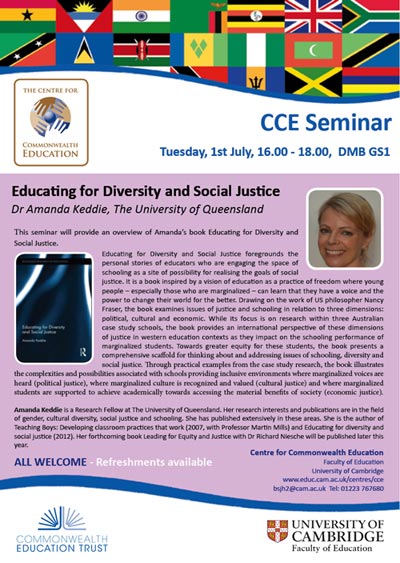 Educating for Diversity and Social Justice
Educating for Diversity and Social Justice
Dr Amanda Keddie, The University of Queensland
Tuesday 1st July 2014
Abstract: Educating for Diversity and Social Justice foregrounds the personal stories of educators who are engaging the space of schooling as a site of possibility for realising the goals of social justice. It is a book inspired by a vision of education as a practice of freedom where young people – especially those who are marginalized – can learn that they have a voice and the power to change their world for the better. Drawing on the work of US philosopher Nancy Fraser, the book examines issues of justice and schooling in relation to three dimensions: political, cultural and economic. While its focus is on research within three Australian case study schools, the book provides an international perspective of these dimensions of justice in western education contexts as they impact on the schooling performance of marginalized students. Towards greater equity for these students, the book presents a comprehensive scaffold for thinking about and addressing issues of schooling, diversity and social justice. Through practical examples from the case study research, the book illustrates the complexities and possibilities associated with schools providing inclusive environments where marginalized voices are heard (political justice), where marginalized culture is recognized and valued (cultural justice) and where marginalized students are supported to achieve academically towards accessing the material benefits of society (economic justice).
Amanda Keddie is a Research Fellow at The University of Queensland. Her research interests and publications are in the field of gender, cultural diversity, social justice and schooling. She has published extensively in these areas.
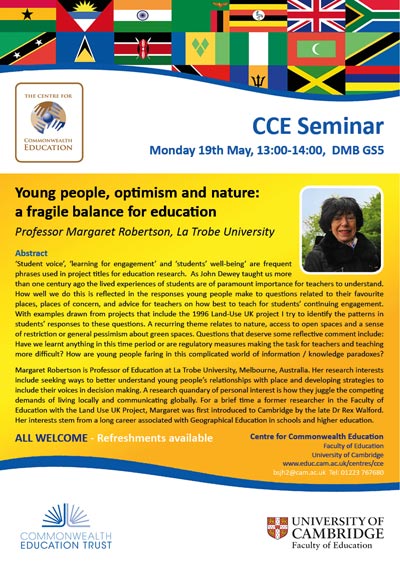 Young people, optimism and nature: a fragile balance for education
Young people, optimism and nature: a fragile balance for education
Professor Margaret Robertson, La Trobe University, Melbourne, Australia
Abstract: ‘Student voice’, ‘learning for engagement’ and ‘students’ well-being’ are frequent phrases used in project titles for education research. As John Dewey taught us more than one century ago the lived experiences of students are of paramount importance for teachers to understand. How well we do this is reflected in the responses young people make to questions related to their favourite places, places of concern and advice for teachers. With examples drawn from projects that include the 1996 Land-Use UK project I try to identify the patterns in students’ responses to these questions. Have we learnt anything in this time period or are regulatory measures making the task for teachers and teaching more difficult? How are young people faring in this complicated world of information / knowledge paradoxes.
Margaret Robertson is Professor of Education at La Trobe University, Melbourne, Australia. Her research interests include seeking ways to better understand young people's relationships with place and developing strategies to include their voices in decision making. A research quandary of personal interest is how they juggle the competing demands of living locally and communicating globally. For a brief time a former researcher in the Faculty of Education with the Land Use UK Project, Margaret was first introduced to Cambridge by the late Dr Rex Walford. Her interests stem from a long career associated with Geographical Education in schools and higher education.
High School Regulatory Environment and Student Disengagement
Guest speaker: Jeremy D. Finn, Graduate School of Education, State University of New York at Buffalo, USA
Wednesday 26th March
Abstract: This presentation overviewed research on school environments ongoing in the U.S., asking whether the issues are similar to those in the U.K., and seeking to identify areas in which we may be able to learn from each other through mutual collaboration.
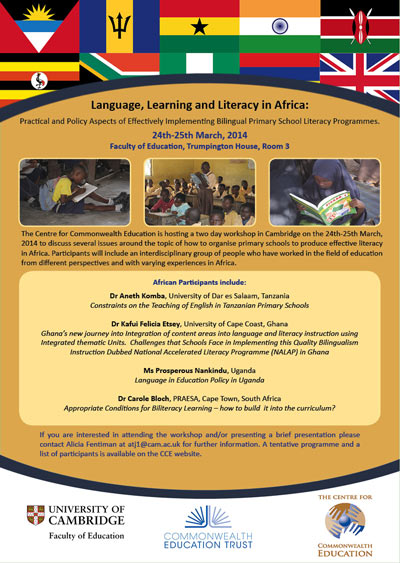 Language, Learning and Literacy in Africa: Practical and Policy Aspects of Effectively Implementing Bilingual Primary School Literacy Programmes
Language, Learning and Literacy in Africa: Practical and Policy Aspects of Effectively Implementing Bilingual Primary School Literacy Programmes
CCE hosted a two day workshop on Language, Learning and Literacy in Africa on 24-25 March, 2014.
Download workshop programme for further details or click on image to download the flyer.
Further details also available via Talks.Cam
CCE - Africa Colloquium
Speakers: Euzobia Baine, Bjoern Hassler, Sara Hennessy, Georgina Horrell, Louis Major, Rebecca Nambi, Sue Swaffield and Molly Warrington
Video podcast now available via CCE Collection on the University's streaming media service
Abstract: This event brought together individuals interested in the topic of education in Africa. Details of diverse African-based research taking place in the Faculty of Education were presented. Attendees then went on to share their own experiences and ideas during a fruitful discussion session.
Click on image to view flyer with titles of presentations.
Poetry Reading
We are delighted that eminent South African Poet Phillippa Yaa de Villiers will be visiting the UK, having been commissioned to write and perform a poem for the Commonwealth Observance Day celebrations in Westminster Abbey. During her visit, she and fellow South African poet, Isobel Dixon will take part in a Teachers' Symposium to be held at Homerton on Saturday 8th March. As part of this event, we are delighted to be able to extend an invitation to a special poetry reading during the afternoon session. Please note that places for this event are limited, so to ensure a place, please contact Sabine Edwards (sce28@cam.ac.uk) to register.
Public Private Partnerships and the implications for educating youth from poor communities: a view from South Asia.
Dr Shailaja Fennell
Abstract: This paper examines the manner in which new private providers of education operate within, and how they withdraw from, the educational marketplace in countries where mass schooling has not yet been achieved. The conceptual framework is drawn from the original model of exit, voice and loyalty in educational markets created by Hirschman in 1970 that set out the mechanisms by which households evaluate the difference in educational provision provided by each provider.
It focuses on the responses of suppliers to exit and voice mechanisms used by households to signal their level of satisfaction with the range of educational provision available from state and non-state providers. The paper maps how new private providers respond to households of different socio-economic status making schooling choices and examines the extent to which type and quality of provision are altered in relation to these schooling choices. The data collected from rural and urban communities in India and Pakistan is used to show how new hierarchies of provision are created, with branding exercises such as English-language learning to attract better-off households and cream skimming methods to attract academically more able students through coaching centres and other supplementary educational provision. The poorer households and less academically able students face economic, social and political hierarchies that work against equal access. The implication of our findings regarding the manner in which new providers are using PPP contracts to further profits and brands in the face of diminished exit and voice mechanisms exercised by poorer households is a rise in the inequality of educational outcomes. Furthermore, the nature of state-private provision interactions work to strengthen existing institutional hierarchies and obstruct the objective of universal access to education and improved quality of educational provision
Tuesday, 18th February, Faculty of Education
The Economics of Religion in India
Dr. Sriya Iyer
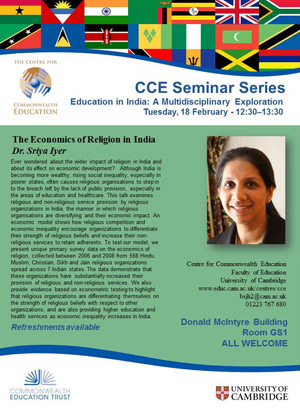 Abstract: Ever wondered about the wider impact of religion in India and about its effect on economic development? Although India is becoming more wealthy, rising social inequality, especially in poorer states, often causes religious organisations to step in to the breach left by the lack of public provision, especially in the areas of education and healthcare. This talk examines religious and non-religious service provision by religious organizations in India, the manner in which religious organisations are diversifying and their economic impact. An economic model shows how religious competition and economic inequality encourage organizations to differentiate their strength of religious beliefs and increase their non-religious services to retain adherents. To test our model, we present unique primary survey data on the economics of religion, collected between 2006 and 2008 from 568 Hindu, Muslim, Christian, Sikh and Jain religious organizations spread across 7 Indian states. The data demonstrate that these organizations have substantially increased their provision of religious and non-religious services. We also provide evidence based on econometric testing to highlight that religious organizations are differentiating themselves on the strength of religious beliefs with respect to other organizations, and are also providing higher education and health services as economic inequality increases in India. Podcast now available via the CCE Collection on the University's streaming media service.
Abstract: Ever wondered about the wider impact of religion in India and about its effect on economic development? Although India is becoming more wealthy, rising social inequality, especially in poorer states, often causes religious organisations to step in to the breach left by the lack of public provision, especially in the areas of education and healthcare. This talk examines religious and non-religious service provision by religious organizations in India, the manner in which religious organisations are diversifying and their economic impact. An economic model shows how religious competition and economic inequality encourage organizations to differentiate their strength of religious beliefs and increase their non-religious services to retain adherents. To test our model, we present unique primary survey data on the economics of religion, collected between 2006 and 2008 from 568 Hindu, Muslim, Christian, Sikh and Jain religious organizations spread across 7 Indian states. The data demonstrate that these organizations have substantially increased their provision of religious and non-religious services. We also provide evidence based on econometric testing to highlight that religious organizations are differentiating themselves on the strength of religious beliefs with respect to other organizations, and are also providing higher education and health services as economic inequality increases in India. Podcast now available via the CCE Collection on the University's streaming media service.
Tuesday, 11th February
New Visual Methodologies in Teaching Modern South Asian History
Dr Annamaria Motrescu-Mayes
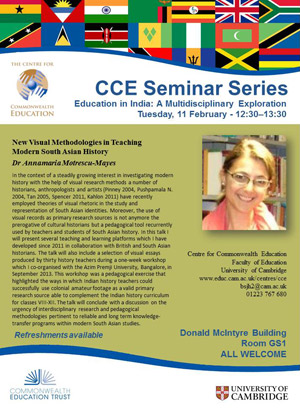 Abstract
Abstract
In the context of a steadily growing interest in investigating modern history with the help of visual research methods a number of historians, anthropologists and artists (Pinney 2004, Pushpamala N. 2004, Tan 2005, Spencer 2011, Kahlon 2011) have recently employed theories of visual rhetoric in the study and representation of South Asian identities. Moreover, the use of visual records as primary research sources is not anymore the prerogative of cultural historians but a pedagogical tool recurrently used by teachers and students of South Asian history. In this talk I will present several teaching and learning platforms which I have developed since 2011 in collaboration with British and South Asian historians. The talk will also include a selection of visual essays produced by thirty history teachers during a one-week workshop which I co-organised with the Azim Premji University, Bangalore, in September 2013. This workshop was a pedagogical exercise that highlighted the ways in which Indian history teachers could successfully use colonial amateur footage as a valid primary research source able to complement the Indian history curriculum for classes VIII-XII. The talk will conclude with a discussion on the urgency of interdisciplinary research and pedagogical methodologies pertinent to reliable and long term knowledge-transfer programs within modern South Asian studies.
Monday 9th December
Learning from Good Practice: Raising School Performance in Developing Countries
Noah Yarrow, World Bank
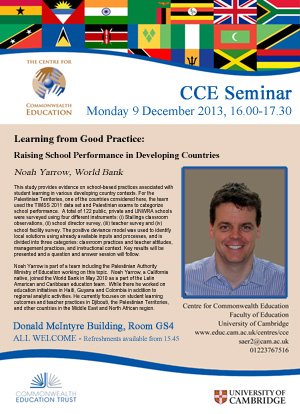 Abstract
Abstract
This study provides evidence on school-based practices associated with student learning in various developing country contexts. For the Palestinian Territories, one of the countries considered here, the team used the TIMSS 2011 data set and Palestinian exams to categorize school performance. A total of 122 public, private and UNWRA schools were surveyed using four different instruments: (i) Stallings classroom observations, (ii) school director survey, (iii) teacher survey and (iv) school facility survey. The positive deviance model was used to identify local solutions using already available inputs and processes, and is divided into three categories: classroom practices and teacher attitudes, management practices, and instructional context. Key results will be presented and a question and answer session will follow.
Noah Yarrow, a California native, joined the World Bank in May 2010 as a part of the Latin American and Caribbean education team. While there he worked on education initiatives in Haiti, Guyana and Colombia in addition to regional analytic activities. He currently focuses on student learning outcomes and teacher practices in Djibouti, the Palestinian Territories, and other countries in the Middle East and North African region.
Thursday, 5th December, Faculty of Education
Young People Still Revolting into Style as a Political Act: Mixing and Breaking the Urban Codes of Austerity and Xenophobia
Dr Jo-Anne Dillabough, Charlotte Rochez and Professor Wendy Pullan
Abstract
In this workshop/presentation, we seek to achieve the following: first, through analyses of documentary evidence (e.g. media reports) and art and music produced by young people living in council estates (Tottenham, UK) or townships (Cape town, South Africa, Lavender Hill), we showcase the diverse ways in which young people who are targeted by police or have ‘done time’ respond to and navigate exclusions associated with the changing city under austerity agendas and heightened racial conflicts. We further explore how the embodiment of racial conflict and urban change are expressed through young people’s artistic and political lives as they confront social housing cuts and rising income disparities in comparative urban contexts. Finally, we make an argument for bridging some of the affective dimensions of living the city with earlier understandings of youth styles as revolt (Hebdige, 1979), and in particular the ‘status and meaning of revolt, the idea of style as a form of refusal as the elevation of crime into art’ (Hebdige, 1979).
The workshop will be broken down into two parts. The first will explore the research and findings of our comparative research and the work of Professor Pullan on her Divided Cities project. The second part will focus on examining forms of visual methodology and material remnants from past time (e.g., photos, film footage, archival documents, artifacts) as a way of expanding our understandings of comparative ethnographic research, and the use of visuals as major teaching tools.
Monday 25th November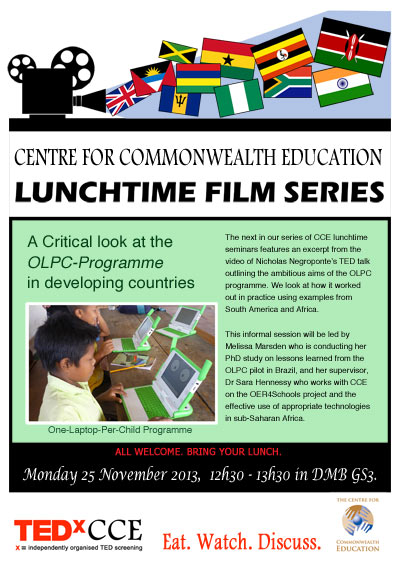
CCE Lunchtim film series
Watch and discuss the outcome of the One-Laptop-Per-Child Programme
ALL WELCOME
Bring along your lunch and join us for this informal lunchtime session.
For further information contact Jill Gather (jg611@cam.ac.uk) at the CCE office.
Thursday 31st October
CCE Lunchtime film series: Poetry & Education
Watch and discuss Sarah Kay's 'If I should have a daughter...'
An independent screening of a TED talk.
Open seminar series: ALL WELCOME
Thursday 17th October
The Right to Education (India) an Inclusive Act?
Akanksha Bapna, CCE Reciprocal Visiting Scholar
In 2009, the Right of Children to Free and Compulsory Education (RTE) became a law in India. The Act has ratified education as a fundamental right and seeks to promote equitable access to education for all children up to the age of 14 years. In this presentation, I discuss the mixed nature of inclusveness of the act. On the one hand, the stringent norms for operating schools in India pose restrictions on private school owners as well as parents, and distort the incentives for improving quality of education. On the other hand, the Act mandates reservation of 25% of the entry-level seats in all private schools for government-sponsored students from economically and weaker sections (EWS) of society with the rationale that this will lead to better learning outcomes for EWS students and increased levels of integration between children from different sections of society.
In this presentation, I discuss this apparent disconnect through a study of the social and financial implications of the Act’s norms and standards using a small sample study conducted in Delhi, and simultaneously examine the opportunities and pitfalls of this reservation policy. Finally, through the lens of a study on primary school vouchers given to 400 randomly selected students in Delhi, I propose a mechanism to reconcile the two contradictory aspects of the Act.
Wednesday 16th October
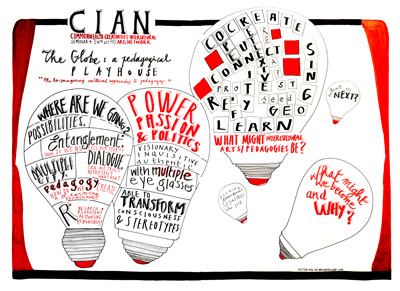 CIAN Public Forum 4: Re-imagining intercultural approaches to pedagogy
CIAN Public Forum 4: Re-imagining intercultural approaches to pedagogy
Convenor: Liz MacKinlay, University of Queensland
Abstract:
This final forum in the CIAN 2013 series examined the role that 'interculturality' and 'indigeneity' play in our understanding of pedagogy, drawing on indigenous, critical curriculum and feminist perspectives and encouraging delegates to develop their ideas through partipation in a range of hands on activities.
Participants from all four fora will be invited to collaborate in a book project, publication of articles and further development of the network.
Wednesday 9th October, 13:00-16:00
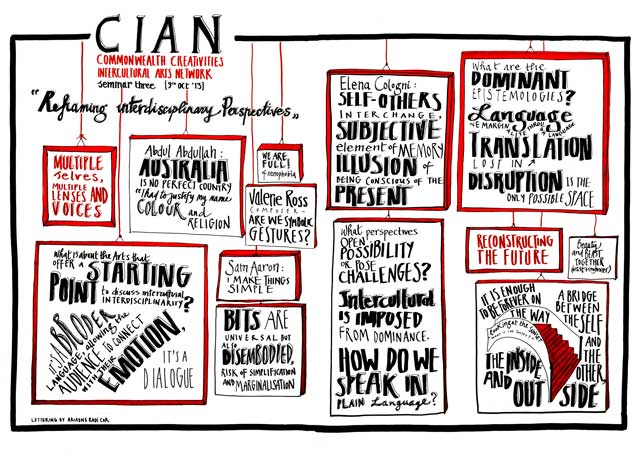 CIAN Public Forum 3: Re-framing interdisciplinary perspectives
CIAN Public Forum 3: Re-framing interdisciplinary perspectives
Convenors: Andrew Blackburn and Jean Penny, University of Pendidikan Sultan Idris
Abstract:
The Forum explored interdiscipliary perspectives on the understanding of intercultural practices focusing on how we engage with epistemological diversity, examining the construction of 'interculturality' and 'indigeneity' across disciplines, and considering diverse types of specialisation and the nature of disciplinary socialisation.
Wednesday 2nd October
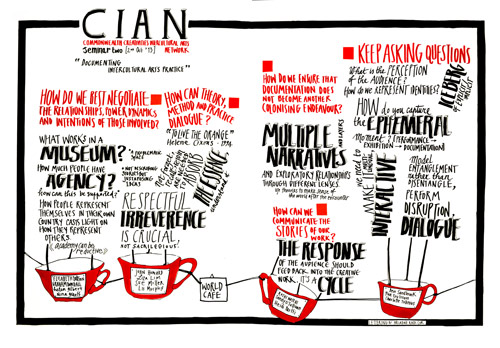 CIAN Public Forum 2: Documenting Intercultural Arts Practice
CIAN Public Forum 2: Documenting Intercultural Arts Practice
Convenor: Brydie-Leigh Bartleet, Queensland Conservatorium, Griffith University, Australia
Abstract:
The forum sought to draw on and interact with practical approaches to intercultural arts performance and performers' richly personal accounts, exploring news ways of engaging, documenting and interpreting intercultural practices, particularly musical improvisation. Download flyer.
See the CIAN network website for details of guest contributors, and further information about the series: http://www.educ.cam.ac.uk/centres/cce/initiatives/projects/cian/
Wednesday 25th September
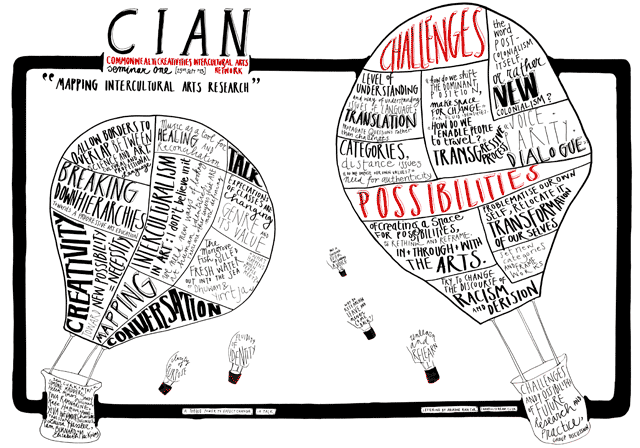 CIAN Public Forum 1: Mapping Intercultural Arts Research
CIAN Public Forum 1: Mapping Intercultural Arts Research
Convenor: Sam Curkpatrick, National Centre for Indigenous Studies (NCIS), Australian National University (ANU)
Abstract:
This introductory forum of the series set out to share and highlight important and emerging themes in intercultural creativities, intercultural arts research and literatures.
Visual minutes / Lettering were produced for all of the fora by Ariadne Radi Cor.
Wednesday 24th July
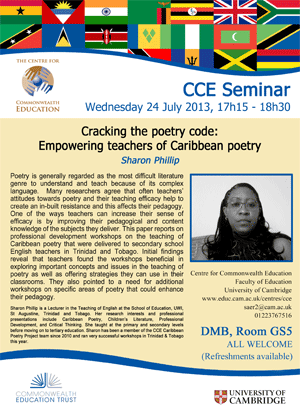 Cracking the poetry code: Empowering teachers of Caribbean poetry
Cracking the poetry code: Empowering teachers of Caribbean poetry
Sharon Phillip, The University of the West Indies
Abstract:
Poetry is generally regarded as the most difficult literature genre to understand and teach because of its complex language. Many researchers agree that often teachers’ attitudes towards poetry and their teaching efficacy help to create an in-built resistance and this affects their pedagogy. One of the ways teachers can increase their sense of efficacy is by improving their pedagogical and content knowledge of the subjects they deliver. This paper reports on professional development workshops on the teaching of Caribbean poetry that were delivered to secondary school English teachers in Trinidad and Tobago. Initial findings reveal that teachers found the workshops beneficial in exploring important concepts and issues in the teaching of poetry as well as offering strategies they can use in their classrooms. They also pointed to a need for additional workshops on specific areas of poetry that could enhance their pedagogy.
Short Bio:
Sharon Phillip is a Lecturer in the Teaching of English at the School of Education, UWI, St Augustine, Trinidad and Tobago. Her research interests and professional presentations include Caribbean Poetry, Children’s Literature, Professional Development, and Critical Thinking. She taught at the primary and secondary levels before moving on to tertiary education. Sharon has been a member of the CCE Caribbean Poetry Project team since 2010 and ran very successful workshops in Trinidad & Tobago this year.
Wednesday 10th July
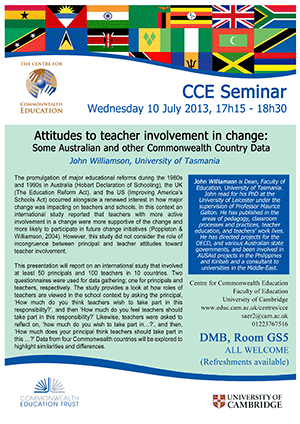 Attitudes to teacher involvement in change: Some Australian and other Commonwealth country data
Attitudes to teacher involvement in change: Some Australian and other Commonwealth country data
John Williamson
Abstract:
The promulgation of major educational reforms during the 1980s and 1990s in Australia (Hobart Declaration of Schooling), the UK (The Education Reform Act), and the US (Improving America’s Schools Act) occurred alongside a renewed interest in how major change was impacting on teachers and schools. In this context an international study reported that teachers with more active involvement in a change were more supportive of the change and more likely to participate in future change initiatives (Poppleton & Williamson, 2004). However, this study did not consider the role of incongruence between principal and teacher attitudes toward teacher involvement.
This presentation reports on an international study that involved at least 50 principals and 100 teachers in 10 countries. Two questionnaires were used for data gathering; one for principals and teachers, respectively. The study provides a look at how roles of teachers are viewed in the school context by asking the principal, ‘How much do you think teachers wish to take part in this responsibility?’, and then ‘How much do you feel teachers should take part in this responsibility?’ Likewise, teachers were asked to reflect on, ‘how much do you wish to take part in…?’, and then, ‘How much does your principal think teachers should take part in this …?’ Data from four Commonwealth countries is used to highlight similarities and differences.
John Williamson is Dean, Faculty of Education, University of Tasmania. John read for his PhD at the University of Leicester under the supervision of Professor Maurice Galton. He has published in the areas of pedagogy, classroom processes and practices, teacher education, and teachers’ work lives. He has directed projects for the OECD , and various Australian state governments, and been involved in AUS Aid projects in the Philippines and Kiribati and a consultant to universities in the Middle-East.
(click on image to download flyer)
Wednesday 26th June
Improving Primary Teacher Education: A Malawi Case
Terry Allsop
Abstract: Across sub-Saharan Africa, it is becoming very clear that many, many children are not learning basic skills in primary schools. There are multiple reasons, but recent seminars in the faculty (Bob Moon and John Pryor/Jo Westbrook) have indicated that the inadequate preparation of primary teachers is a significant factor. This seminar should build on the earlier contributions through reporting on work currently being undertaken in Malawi with the primary teachers colleges and their partnership schools, with a particular focus on the school-based second year spent in often struggling primary schools. Issues to do with demography, funding and sustainability will be considered. Early evaluation findings will be reported.
Short bio: Terry Allsop worked for many years as a science teacher and teacher educator – in the UK, Hong Kong and Uganda. Of these, seventeen years were served in the Oxford University Department of Educational Studies, at a time of considerable experimentation there in school-focused teacher education. He led the Oxford contribution to the creation of the Institute for Educational Development at the Aga Khan University in Karachi, and spent sabbatical time studying science teaching in China. He left Oxford to join the Department for International Development as a senior education adviser, with responsibilities in various African programmes and as manager of the department’s educational research. His final full-time post was as the second Director of the International Research Foundation for Open Learning, based here in Cambridge. He has decided that retirement is a silly idea, recently working in a number of conflict or post-conflict environments. (download flyer)
Monday 20th May
Preparing teachers for early learning in Sub Saharan Africa
John Pryor and Jo Westbrook, University of Sussex
Abstract: This seminar describes the Teacher Preparation in Africa project, a mixed methods research project which investigated the education of teachers in six countries in sub Saharan Africa, with a focus on learning to teach mathematics and reading in the early years of primary school. After a brief presentation of the findings of the project we will go on to discuss ways in which teacher preparation might be conceptualized and planned in such a way as to offer more to those at the start of their career than is currently available.
♦ John Pryor is Reader in Education at the University of Sussex, working especially within the Centre for International Education (CIE). He began his career as teacher in primary and secondary schools with a particular interest in development education. Following a doctorate on gender and group work in education, John took up a post as research fellow and subsequently lecturer at Sussex. His research interests centre on aspects of social identity and equity in education including formative assessment and pedagogy, international and intercultural study and research training and the doctorate in the social sciences. John has directed research projects in both the UK and sub Saharan Africa mostly of a broadly micro-sociological nature including collaborative ethnography and action research.
♦ Jo Westbrook is a Senior Lecturer in Education at the University of Sussex working mostly within the Centre for International Education. She has worked as a secondary school teacher of English in London and in Uganda, where she also worked in teacher education at a National Teachers’ Centre. Jo’s research interests lie in the development of readers and reading communities with a particular interest in comprehension strategies for young and adolescent learners – and in teacher learning. She has been a PI for collaborative research projects on the transition from trainee to NQT in develop
ing countries and most recently on systematic and rigorous literature reviews on pedagogy and teacher education in developing countries.
Monday 29th April
Educating Teachers in Developing World Contexts: The imperative for radical reform
Bob Moon, Emeritus Professor of Education: The Open University
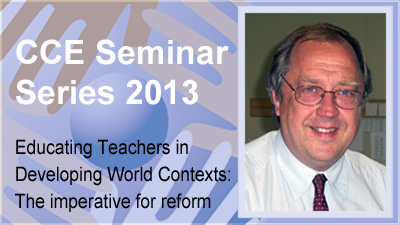 Abstract: The school systems of all developing countries have expanded rapidly over the last decade. The quest to have every child in basic education by 2015 (A Millennium Development Goal) has galvanised governments and international agencies to take action. However the parallel challenge to provide sufficient, well educated, teachers lags some way behind. In many developing countries teacher supply, retention, education and training are verging on crisis. In this context Bob Moon will argue that a radical reform of teacher education structures and systems will be necessary if the life chances of young people are to be improved. In particular he will suggest that the domination of European and North American orthodoxies towards teacher preparation are fostering conservative resistance to change. In making this analysis he will suggest new strategies that need to be embraced, including a rethink of the research priorities currently favoured by international agencies. He will also suggest ways in which the UK Higher Education sector could play a more significant role in responding to the challenge to make global education systems more equitable and just. The presentation will draw on work from the ten country Teacher Education in Sub-Saharan Africa (TESSA) programme that Bob Moon founded and directed as well as his most recent book, ‘Teacher Education and The Challenge of Development’, which was published this year in the series Education, Poverty and International Development edited by Madeleine Arnot and Chris Colclough.
Abstract: The school systems of all developing countries have expanded rapidly over the last decade. The quest to have every child in basic education by 2015 (A Millennium Development Goal) has galvanised governments and international agencies to take action. However the parallel challenge to provide sufficient, well educated, teachers lags some way behind. In many developing countries teacher supply, retention, education and training are verging on crisis. In this context Bob Moon will argue that a radical reform of teacher education structures and systems will be necessary if the life chances of young people are to be improved. In particular he will suggest that the domination of European and North American orthodoxies towards teacher preparation are fostering conservative resistance to change. In making this analysis he will suggest new strategies that need to be embraced, including a rethink of the research priorities currently favoured by international agencies. He will also suggest ways in which the UK Higher Education sector could play a more significant role in responding to the challenge to make global education systems more equitable and just. The presentation will draw on work from the ten country Teacher Education in Sub-Saharan Africa (TESSA) programme that Bob Moon founded and directed as well as his most recent book, ‘Teacher Education and The Challenge of Development’, which was published this year in the series Education, Poverty and International Development edited by Madeleine Arnot and Chris Colclough.
Abstract and Bio A podcast is available at: http://sms.cam.ac.uk/media/1476758.
Wednesday 27th March 2013
Transnational fears about marginalized young people at the borders of the nation
Dr Jo-Anne Dillabough, University of Cambridge and Dr Caroline Oliver, University of Oxford
Abstract: Mobile, transnational narratives of moral panic have infiltrated and transformed youth cultural activities, while simultaneously affecting multicultural policies in relation to ideas about the nation, race, and migration. The agents of this growing, urban threat are seen to be what former British Prime Minister Margaret Thatcher called ‘the enemy within’, disaffected young people who are characteristically from ethnic or religious minorities and often economically disadvantaged. In the midst of current global political and economic insecurities, we can witness the role of what Etienne Balibar and Chris Rumford (2010) refer to as border anxiety in constituting the ideological borders of the nation. These representations of young people can be read as a form of border work where legitimacy and citizenship are established not only through the use of legal principles such as residency and human rights, but through invisible cultural forces which appear to uphold ‘equality’ for all.
This event was co-sponsored by: EED, CCE, and the David Lam Chair in Multicultural Education
Tuesday 12th March
Education in Countries Emerging from Conflict in Africa
Alicia Fentiman and Ilse Wermink
Abstract: The seminar focused on the challenges of educational provision in African countries emerging from conflict, highlighting key areas for discussion such as teacher training, identifying the most appropriate means of delivery, reaching out to over-age youth and adults through alternative basic education initiatives, and the political implications affecting the language of instruction. The seminar draws on data from the diverse educational programmes that the Africa Educational Trust has been implementing in some of the poorest countries in Africa, affected not only by poverty, famine and drought but also by conflict and war such as Somalia, South Sudan and northern Uganda. (www.africaeducationaltrust.org).
Podcast & Presentation: A podcast is now available at http://sms.cam.ac.uk/media/1442269. Accompanying presentation also available for download.
Alicia Fentiman is a Commonwealth Fellow at the CCE, University of Cambridge. She is a social anthropologist and has worked extensively in sub-Saharan Africa for over twenty five years on a number of educational research projects and evaluations.
Ilse Wermink is a Programme Coordinator from the Africa Educational Trust in London. She is responsible for the overall management of the South Sudan teacher training project.

